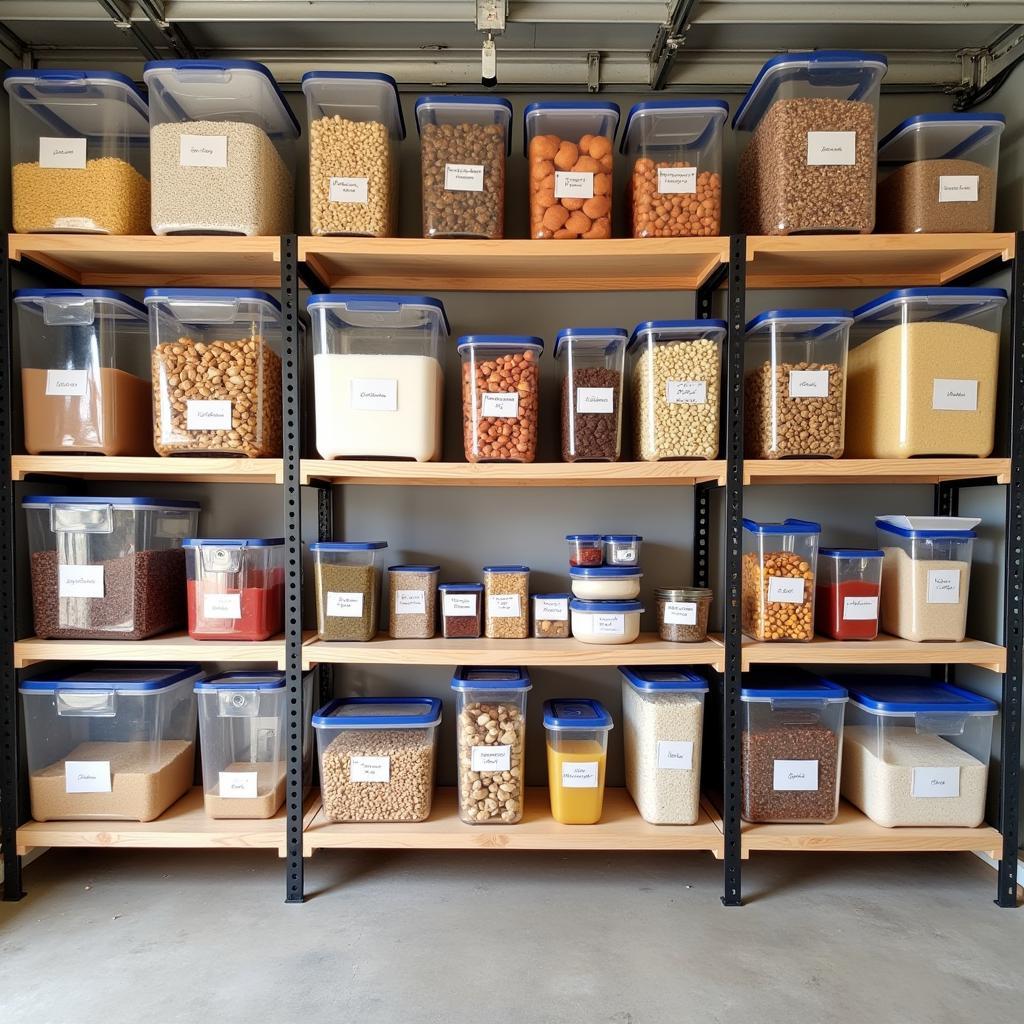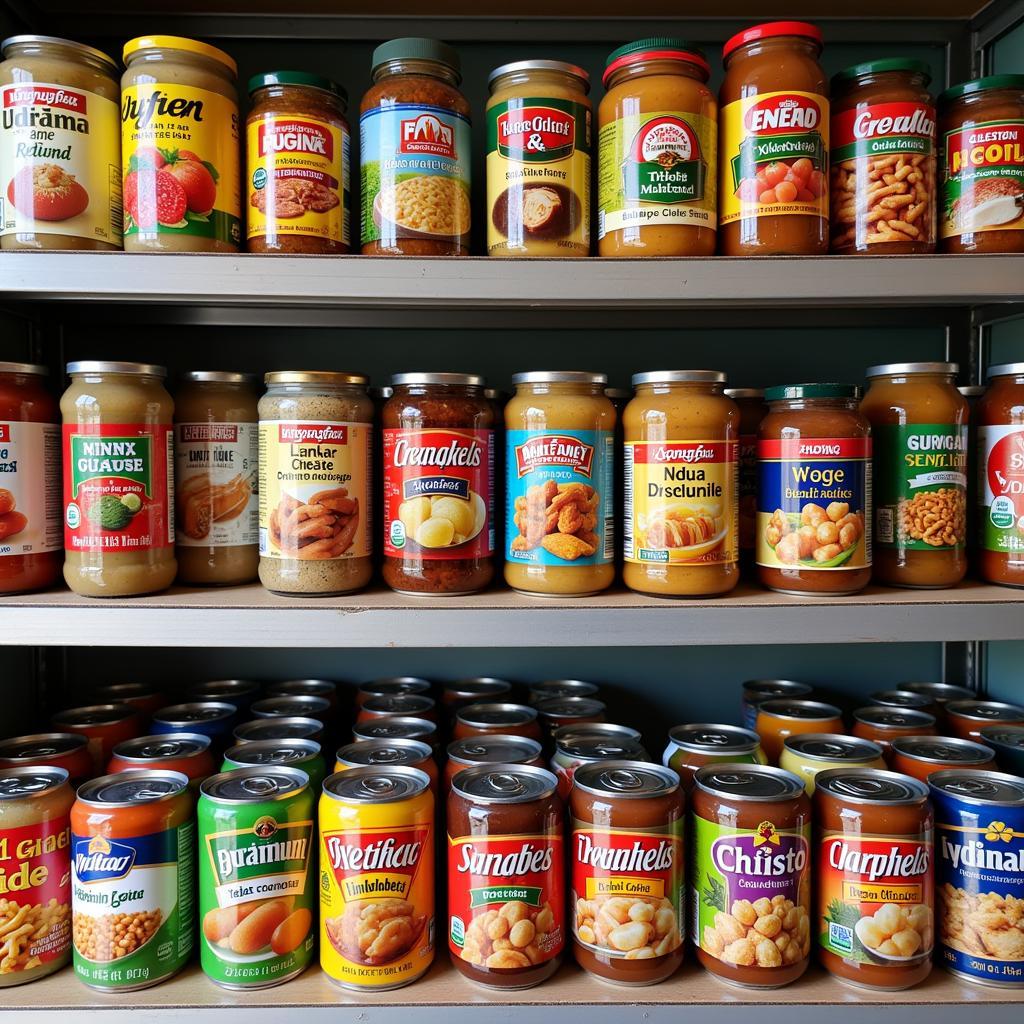Storing food in your garage can be a tempting solution to maximize pantry space, especially for bulk buys or seasonal goods. However, it’s crucial to understand the factors that can impact food quality and safety before transforming your garage into a makeshift pantry. This guide will walk you through everything you need to know about storing food in the garage effectively.
Is Your Garage a Food-Safe Zone?
While garages offer extra storage, they aren’t always designed with food safety in mind. Here’s what to consider:
- Temperature Fluctuations: Garages often experience extreme temperature swings, from scorching summer heat to freezing winter temperatures. These fluctuations can compromise the quality and safety of perishable foods, causing spoilage, texture changes, and even foodborne illnesses.
- Humidity: Garages tend to be more humid than the controlled environment inside your home. Excess moisture can lead to mold growth on food packaging and surfaces, as well as attract pests seeking shelter and sustenance.
- Pests: Open garage doors, cracks in walls, and vents can create entry points for rodents, insects, and other unwanted critters seeking easy access to food.
- Chemicals and Fumes: Garages often house vehicles, gasoline, paints, and other chemicals that can release harmful fumes. These fumes can permeate food packaging and affect its taste and safety.
 Food stored on garage shelving
Food stored on garage shelving
What Foods Can You Store in the Garage?
Despite the challenges, some food items can be safely stored in the garage with proper precautions:
Foods that generally store well in the garage:
- Non-perishable pantry staples: Canned goods, dried beans, rice, pasta, spices, oils, and packaged snacks in airtight containers.
- Pet food: Store dry pet food in airtight containers to prevent pests and maintain freshness.
- Beverages: Unopened bottled water, sodas, and canned drinks can be stored in the garage, but monitor for temperature fluctuations that could affect taste.
Foods to avoid storing in the garage:
- Perishable foods: Meat, poultry, fish, dairy products, fresh fruits, and vegetables require refrigeration or freezing to prevent spoilage and bacterial growth.
- Opened packages: Once opened, transfer remaining food to airtight containers to minimize exposure to air, moisture, and pests.
- Foods that absorb odors: Items like flour, sugar, coffee, and tea can easily absorb strong odors from chemicals and fumes commonly found in garages.
Tips for Safe and Effective Garage Food Storage
Follow these tips to optimize food safety and quality:
1. Temperature Control:
- Choose a cool, dry location: If possible, designate a specific area in your garage that remains relatively cool and dry, away from direct sunlight, windows, and heat sources.
- Utilize insulation: Consider insulating the walls and ceiling of your garage or the designated storage area to minimize temperature fluctuations.
- Employ climate control: If your budget allows, invest in a portable air conditioner or heater to maintain a more stable temperature in your garage, especially during extreme weather conditions.
2. Pest Prevention:
- Seal entry points: Inspect your garage for cracks, gaps, and holes, and seal them properly to prevent pests from entering. Pay attention to areas around doors, windows, vents, and utility lines.
- Maintain cleanliness: Regularly clean your garage, removing food debris, spills, and clutter that can attract pests.
- Use airtight containers: Store all food, including pet food, in airtight containers made from durable materials like plastic or glass.
- Consider natural repellents: Place bay leaves, cedar chips, or other natural pest repellents around your storage area to deter insects and rodents.
3. Proper Storage Practices:
- Utilize shelving: Keep food off the floor by using sturdy shelves made from metal or plastic. This promotes air circulation and makes it harder for pests to access your supplies.
- Label and date everything: Clearly label all containers with the contents and storage date. This helps you rotate your stock and use older items before they expire.
- Practice FIFO: Implement the “First In, First Out” method, using older items before newer ones to minimize waste and ensure freshness.
- Inspect regularly: Periodically check your stored food for signs of spoilage, pests, or damage. Discard any items that appear compromised.
Frequently Asked Questions about Storing Food in the Garage
Can I store potatoes and onions in the garage?
Potatoes and onions are best stored in a cool, dark, and well-ventilated area with temperatures around 45-55°F (7-13°C). While a garage might seem suitable, the temperature fluctuations can cause them to sprout or spoil faster.
What about storing water bottles in the garage?
Unopened, commercially bottled water is generally safe to store in the garage. However, avoid storing water in reusable plastic bottles, as they might leach chemicals in extreme temperatures. Always check for any off-putting smells or tastes before consuming water stored in the garage.
How can I keep rodents out of my garage food storage?
Prevention is key! Seal any potential entry points, keep your garage clean, and store all food in airtight containers. Consider using natural rodent repellents or traps if you notice signs of infestation.
 Canned goods arranged in a garage pantry
Canned goods arranged in a garage pantry
Conclusion
Storing food in the garage can offer convenient extra space, but it’s essential to approach it with caution and prioritize food safety. By carefully considering factors like temperature, humidity, and pest control, and following proper storage practices, you can minimize risks and make informed decisions about what foods to store in your garage. Remember to inspect your stored food regularly and enjoy the benefits of a well-organized and utilized space.
Need help with your pet food storage? Check out our articles on fish food high protein and best puppy food for labrador retrievers.
If you have any further questions or need personalized advice on storing food in your garage, don’t hesitate to contact us. Our team at Mina Cones Food is dedicated to providing you with reliable information and resources to ensure your food storage practices are safe and effective. Reach us at 02437655121, email us at minacones@gmail.com, or visit us at 3PGH+8R9, ĐT70A, thôn Trung, Bắc Từ Liêm, Hà Nội, Việt Nam. Our customer support team is available 24/7 to assist you.